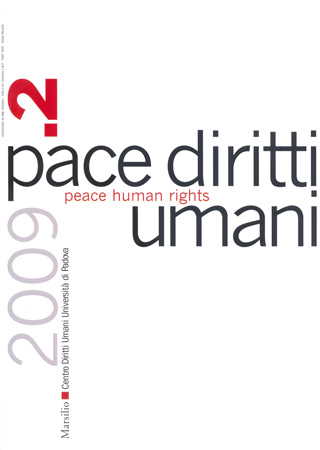Collections

Un mondo libero dalle armi nucleari: le iniziative dei protagonisti della bomba 1944-1946
- Contained in
- Pace diritti umani - Peace Human Rights, 2/2009
- Pubblication type
- Articolo / Saggio
- Pages
- 107-146
- Language
- IT
A World Free of Nuclear Weapons: The Undertakings of the Protagonists of the Bomb, 1944-1946
The April 1 London declaration by the Presidents of Russia and USA has reintroduced in the international agenda the long-honoured concept of «nuclear free world» as a politically attainable goal. This brings to the highest operative level a renewed interest of scholars and politicians on the global nuclear disarmament triggered by Henry Kissinger, George Shultz and William Perry, with their January 2007 article in the «Wall Street Journal». The present paper considers the first attempts of preventing the nuclear arms race made between 1944 and 1946 by a few scientists involved in production of the first atomic weapons. Besides reconsidering important historical events and exploring the genesis of the very concept of freeing the world from nuclear weapons, we aim to understanding the reasons behind the positive results and failures of these initiatives, in order to learn from them lessons for today actions towards nuclear disarmament.
The cases considered start from the bold actions of Niels Bohr and his objective of creating an «open world» in order to prevent an atomic arms race between Soviet Union and the Western powers. He believed that the current organisation of the world could not cope with the atomic bomb, and this made him consider the bomb as an opportunity to make necessary for states to cooperate, providing the basis for a new approach to international relations. His ideas and suggestions were not accepted by Churchill and Roosevelt, but created, directly or indirectly, the conceptual background for the proposals, which appeared in the following.
The necessity of an international control on atomic energy was stressed to the US government by Vannevar Bush and James Conant, who were the civilian leaders of the atomic project and consultants of Roosevelt and Truman on atomic policy. They accepted the views of Bohr, and made clear to War Secretary Stimson the impossibility for US to keep the secret and the monopoly of nuclear energy and to control the raw materials, the risks of further weapon developments and suggested the constitution of an international scientific office to control atomic energy all over the world.
In the fall of 1945 Bush convinced the US and UK leaders to propose to Stalin the creation by the United Nations of an Atomic Energy Commission (UNAEC) to study how atomic weapons might be eliminated and atomic energy applied to peaceful uses.
Bush and Conant were also influenced by the lively discussions among the scientists of the Met Lab of Chicago on the future of nuclear research and the political implications of nuclear weapons. The concerns of the scientists are expressed in the November 1944 Jeffries report, which calls for an «international administration with police powers which can effectively control at least the means of nucleonic warfare». The subsequent (June 1945) Franck report looks to international control, but also takes up the question of the use of nuclear weapons against Japan in relation to post-war international agreements on nuclear energy. Its conclusion is that an actual unannounced use of the bomb against Japan is unadvisable for the blame it would have put on US for introducing such indiscriminate weapon and the subsequent difficulties in reaching an international control system to ban the bombs. The report stresses the view of the bomb as a problem of long-range politics rather than a military expediency. The report saw also the contributions of Eugene Rabinowitch and Leo Szilard, and after the end of the war became a «manifesto» for the US scientists’ movements aiming to a civilian control of atomic energy internally and to an international agency to prevent nuclear weapons. Additional initiatives were attempted by Franck and Szilard to prevent the bombing of Japan, but proved fruitless.
The various strains of thoughts on preventing a nuclear race and controlling nuclear energy – the inspiration of Bohr, the analyses of the Jeffries report, the thesis of the Franck report, the ideas of Bush shared with Conant – all flow together in the Acheson-Lilienthal report on «the International Control of Atomic Energy», prepared in March 1946 for the US Secretary of State in view of a plan to be submitted to the UN Atomic Energy Commission. The aims of the report, largely due to Robert Oppenheimer, were twofold: the prevention of atomic weapons and the promotion of civilian uses of nuclear energy. The report first details the characteristics of an adequate system of safeguards and controls for security, to recognize the impossibility of creating such a system if every nation is allowed to develop independently nuclear energy. Therefore it suggests to create an international independent Atomic Development Authority to own and control world supplies of uranium and thorium, construct and operate reactors and separation plants, develop active research in nuclear fields, and license and inspect peaceful non-dangerous activities in individual countries.
The actual plan proposed to UNAEC by the US delegation, led by Bernard Baruch, modified the Acheson-Lilienthal, with conditions unacceptable to the Soviet Union, and after its approval by majority of UNAEC members, the Soviet veto ensured that the Security Council would not endorse the Commission’s report.
Finally we consider the reasons for the failure of these first efforts to bring atomic energy under international control and avoid the nuclear arms race, underlining the critical role of the political context for nuclear disarmament and the need of a common conception of the world and how it might develop.
The proposals by the scientists were brilliant technocratic, rather than political, approaches to dealing with international politics, and proved necessarily inadequate. Suggestions for the present situation are consequently derived.

